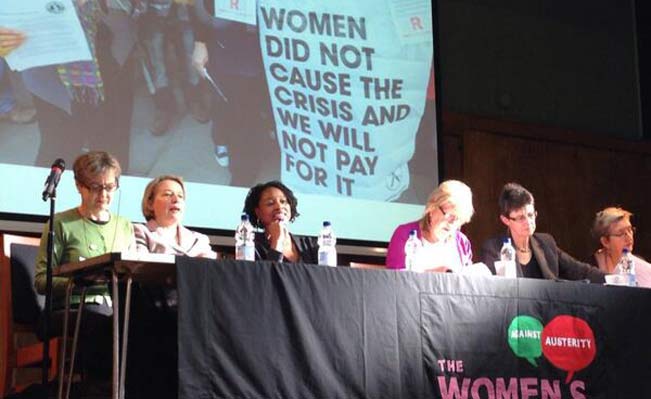
Isabelle Leach reports on the Women’s Assembly and its importance in the fight against austerity
It is possible that people have doubted the necessity of organising a Women’s Assembly Against Austerity, but the atmosphere yesterday proved them wrong. This was a space for women activists to get together and discuss the direct impact of austerity on women, and by all accounts, it was an important conference.
Women participating wanted to work out how, through women’s campaigns and issues, we could intensify the resistance against austerity. We could not be stopped. Unlike some other meetings where women may leave the contributions to other comrades, it seemed like every woman wanted to speak first and share experiences of struggles in their workplaces and communities.
The opening session set the context for discussing the various struggles women are involved in, with Dawn Butler, former Labour minister, outlining the lack of representation for women, and which has led to such savage cuts to women’s work and services.
Natalie Bennett, Leader of the Green Party, emphasised the need for everyone to have a decent standard of life within the limits of our planet, and Ann Henderson, Assistant Secretary of the Scottish TUC, highlighted women’s involvement with trade union activism that is often hidden in history.
Kate Hudson, General Secretary of CND, told us that while money was being spent on weapons and war, services that benefit women were being cut. Sarah Veale, Head of Equality and Employment Rights at TUC, argued for organisation to spring from the recent victories in the trade union movement. Statistics about cuts in public services, quadrupling food banks, and the real figures on women’s employment as part-time or underpaid were revealing.
Busting the myths
As the opening plenary closed for lunch, people divided into the workshops representing different issues affecting women. These included busting the myths around austerity, racism, health, education, community campaigning, war, transport and working conditions.
Despite the specific workshops that catered for different interests, many women were torn as to which to choose, but lots of live tweeting meant everyone could keep up to date with meetings next door or across the road at Unite the Union. There were many reports that every contribution in each session had been important and insightful, with mutual support and concern in each discussion.
The final plenary offered a push of encouragement to take today’s lessons and go out and organise. Christine Blower, General Secretary of NUT made a call to organise in defence of education, especially with the NUT’s upcoming strike on 26 March. Louise Irvine highlighted women’s contribution to the Save Lewisham Hospital campaign.
Lindsey German, convenor of Stop the War Coalition cited women’s campaigns for equal pay in the 1970s as examples for fighting austerity today. We have no choice but to fight this twisted and horrible government, she said, which has created a situation where people are reduced to stealing to feed their families. German called this not a civilised society but a barbaric one, and pointed to the relevance of Brecht quote, that if we don’t fight, we have already lost.
Kate Smurthwaite, comedian, talked about the need for breaking down harmful stereotypes and stigmas through language and humour. Finally, Gloria Mills, Head of Equalities at Unison, closed the conference with a rousing speech on the value of women’s vote in the face of social regression by corporate and management abuse of power. She said, and many tweeted, that the government can’t keep us down or hold women back, and that the movement against austerity must be visible and in the streets.
Empowering, liberating, exciting and safe
Many felt that a women’s only space was empowering, liberating, exciting and safe. Amongst the serious strategies, there were a lot of jokes and pantomime boos, with humour being something that the women’s movement does so well.
The emphasis was on what we had in common, not what divided us, and the feeling of a united movement was strong at Conway Hall. We were not starting from the beginning, as the People’s Assembly has done so much work already to build the fight against austerity.
Most if not all the 300 or so women who participated are already involved in campaigns to bring down the government’s austerity programme. This assembly was to give women the confidence to go back and continue their work feeling supported and united, and with more inspiration than before.
The enthusiastic response to the Women’s Assembly suggests there is a lot more to come from women to intensify the movement against austerity and win.

